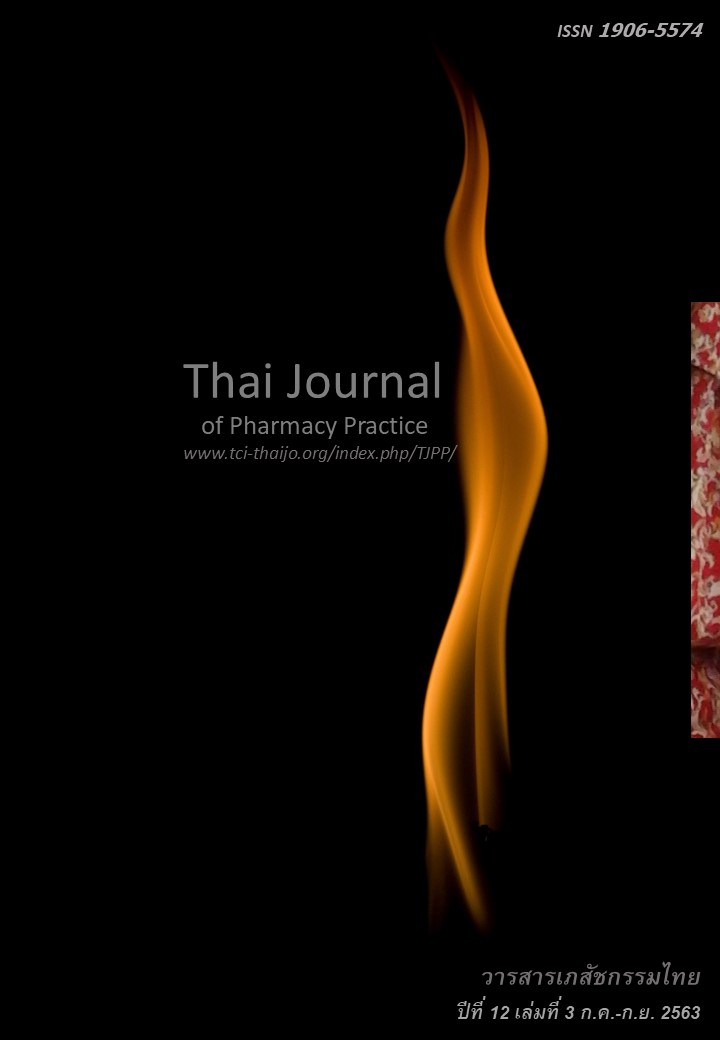ความเชื่อมโยงของการจัดการตนเองเพื่อการดูแลโรคและการใช้ยา กับบริบทการดำเนินชีวิตของผู้ป่วยเบาหวานและความดันโลหิตสูง
Main Article Content
บทคัดย่อ
วัตถุประสงค์: เพื่อทำความเข้าใจกระบวนการจัดการโรคเรื้อรังของผู้ป่วยเบาหวานและความดันโลหิตสูงที่ควบคุมโรคไม่ได้ตามความเป็นจริงที่เกิดขึ้นในบริบทพื้นที่ที่ศึกษาในมุมมองของผู้ป่วย และ เพื่อค้นหาความเชื่อมโยงของบริบทแวดล้อมกับการจัดการตนเองเรื่องโรคและยา วิธีการ: การศึกษานี้เป็นการวิจัยเชิงคุณภาพโดยสัมภาษณ์เชิงลึกในกลุ่มผู้ป่วยที่ไม่สามารถควบคุมโรคได้ 9 คน ตามแนวคำถามแบบกึ่งโครงสร้าง ผลการวิจัย: ผู้ป่วยมีการจัดการตนเองที่แตกต่างกันตามปัจจัยที่เกี่ยวข้องในการดำเนินชีวิตของแต่ละบุคคล แต่พบว่ามีความเชื่อมโยงกับ 5 ปัจจัยหลักที่สำคัญ คือ สภาวะสุขภาพที่มีผลต่อความสามารถในการจัดการตนเองของผู้ป่วย ทัศนะคติที่มีต่อโรคเรื้อรัง การรักษา และการใช้ยา ระบบบริการสุขภาพในระดับปฐมภูมิและกระบวนการเยียวยาผู้ป่วยโรคเรื้อรัง สภาพชุมชนความเป็นอยู่และการประกอบอาชีพของคนในสังคม รวมถึงความพร้อม ความสัมพันธ์ และสถานะทางเศรษฐกิจของครอบครัว สรุป: ทุกปัจจัยที่เกี่ยวข้องกับผู้ป่วยส่งผลต่อการจัดการตนเองด้านสุขภาพทั้งด้านการเป็นสิ่งสนับสนุนและเป็นอุปสรรคต่อการควบคุมโรค
Article Details
ผลการวิจัยและความคิดเห็นที่ปรากฏในบทความถือเป็นความคิดเห็นและอยู่ในความรับผิดชอบของผู้นิพนธ์ มิใช่ความเห็นหรือความรับผิดชอบของกองบรรณาธิการ หรือคณะเภสัชศาสตร์ มหาวิทยาลัยสงขลานครินทร์ ทั้งนี้ไม่รวมความผิดพลาดอันเกิดจากการพิมพ์ บทความที่ได้รับการเผยแพร่โดยวารสารเภสัชกรรมไทยถือเป็นสิทธิ์ของวารสารฯ
เอกสารอ้างอิง
Institution of Medical Research and Technology Assessment, Department of Medical Services. Literature Review: the current situation and care model of non-communicable diseases. Bangkok: Art Qualified; 2014
Thangkratok P. The role of the nurse in the chronic disease management. Songklanagarind Journal of Nursing. 2017; 37: 154-9.
Improving Chronic Illness Care. Self-management support [online]. 2017 [Aug 27, 2017]. Available from: ww.improvingchroniccare.org/index.php?p=Se lfManagement_Support&s=39.
Sanee A. Self management program in chronic diseases. Journal of The Royal Thai Army Nurses. 2014; 15: 129-34.
Wangji N. Effect of behavioral modification program on medical adherence and blood pressure for muslim elderly with uncontrolled hypertension. 34th the National Graduate Research Conference: Prince of Songkla University; 2015. p. 835-46.
Furler J, Walker C, Blackberry I, Dunning T, Sulaiman N, Dunbar J, et al. The emotional context of self-management in chronic illness: a qualitative study of the role of health professional support in the self-management of type 2 diabetes. BMC Health Serv Res 2008; 8: 214.
Dwarswaard J, Bakker EJ, Staa A, Boeije HR. Self‐management support from the perspective of patients with a chronic condition: a thematic synthesis of qualitative studies. Health Expect 2016; 19: 194-208.
Schulman‐Green D, Jaser S, Martin F, Alonzo A, Grey M, McCorkle R, et al. Processes of self‐management in chronic illness. J Nurs Scholarship 2012; 44: 136-44.
Junchai J, Therawiwat M, Imamee N. Diabetes education and self-management program of persons with type 2 diabetes, Prachuap Khiri Khan province. The Public Health Journal of Burapha University. 2012; 7: 69-83.
Peeraphruetthipong N, Pakdevong N, Namvongprom A. Effects of self-management program on know- ledge, self–care activities, and HbA1c in persons with type 2 diabetes mellitus. Journal of Nurses' Association of Thailand, North-Eastern Division. 2012; 30: 98-105.
Ngoenthae D, Arpanantikul M, Duangbubpha S. Self-Care experience of people with chronic obstructive pulmonary disease (COPD) exacerba- tion. Thai Journal of Nursing Council. 2017; 32: 47-63.
Bodenheimer T, Lorig K, Holman H, Grumbach K. Patient self-management of chronic disease in primary care. JAMA 2002; 288: 2469-75.
Ryan P, Sawin KJ. The individual and family self-management theory: background and perspectives on context, process, and outcomes. Nurs Outlook 2009; 57: 217-25.e6.
Funnell MM. Peer-based behavioural strategies to improve chronic disease self-management and clinical outcomes: evidence, logistics, evaluation considerations and needs for future research. Fam Pract 2010; 27 Suppl 1: i17-22.
Gordon K, Smith F, Dhillon S. Effective chronic disease management: patients' perspectives on medication-related problems. Patient Educ Couns 2007; 65: 407-15.
Gascon JJ, Sanchez-Ortuno M, Llor B, Skidmore D, Saturno PJ. Why hypertensive patients do not comply with the treatment: results from a qualitative study. Fam Pract 2004; 21: 125-30.
Sawanpracharak Hospital. Annual performance sum mary. Nakhonsawan: Sawanpracharak Hospital; 2016.
Wat Sai Tai Community Health Center. Assessment report of primary care unit according to the standard criteria. Nakhonsawan: Wat Sai Tai Community Health Center; 2018.
Health Data Center. Information for service plan DM, HT [online]. 2017 [cited Nov 30, 2018]. Available from: hdcservice.moph.go.th/hdc/reports/page.php? cat_id=b2b59e64c4e6c92d4b1ec16a599d882b.
Ministry of Public Health. Information to respond
service plan DM HT [online]. 2017 [cited Nov 29, 2018]. Available from: hdcservice.moph.go.th/hdc/ reports/page.php?cat_id=b2b59e64c4e6c92d4b1ec16a599d882b.
Photisita C. Science and art of qualitative research. Bangkok: Amarin Printing&Publishing; 2001.
Haraldsson HV. Introduction to system thinking and causal loop diagrams. Lund: Department of Chemical Engineering, Lund University; 2004.
De Pinho H. Systems tools for complex health systems: A guide to creating causal loop diagrams [online]. 2015 [cited May 5, 2019]. Available from: www.who.int/alliance-hpsr/resources/publications/C LD_Course_Participant_Manual.pdf.
Chuengsatiansup K, Kata P. Primary care [online]. 2016 [cited Aug 30, 2017]. Available from: www.h focus .org/content/2016/01/11628.
Junchai J, Therawiwat M, Imamee N. Diabetes education and self-management program of persons with type 2 diabetes, Prachuap Khiri Khan province. The Public Health Journal of Burapha University. 2012; 7: 69-83.
Sujamnong S, Therawiwat M, Imamee N. Factors related to selfmanagement of hypertensive patients, Taladkwan district health promoting hospital, Nonthaburi province. Journal of Boromarajonani College of Nursing, Bangkok. 2013; 29: 21-30.
Chungsathiansap K, Sringernyuang l, Paonin W. Drug Use in the Community. Bangkok: Society and Health Institute; 2007.
Dixon EL. Community health nursing practice and the Roy Adaptation Model. Public Health Nurs 1999; 16: 290-300.


